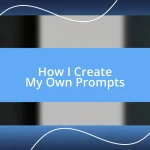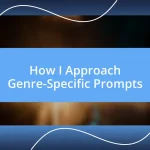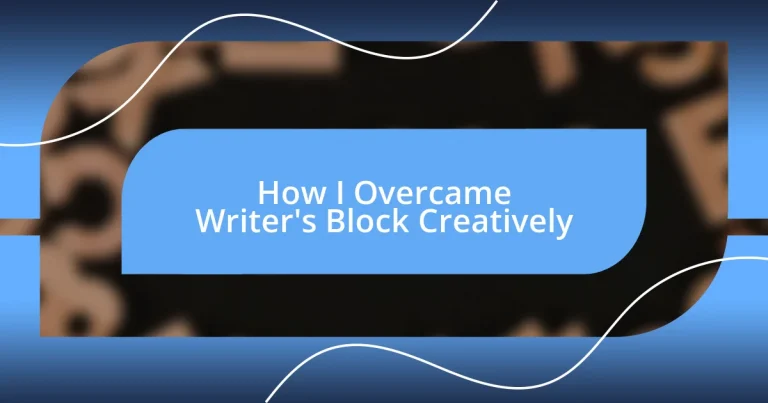Key takeaways:
- Writer’s block often arises from emotional factors like stress and perfectionism, and acknowledging these feelings can help overcome it.
- Identifying personal creative triggers—such as nature, music, and art—can reignite writing passion and enhance creativity.
- Engaging in reflective practices, like reviewing past work and maintaining a writing journal, fosters growth and motivation in the writing journey.
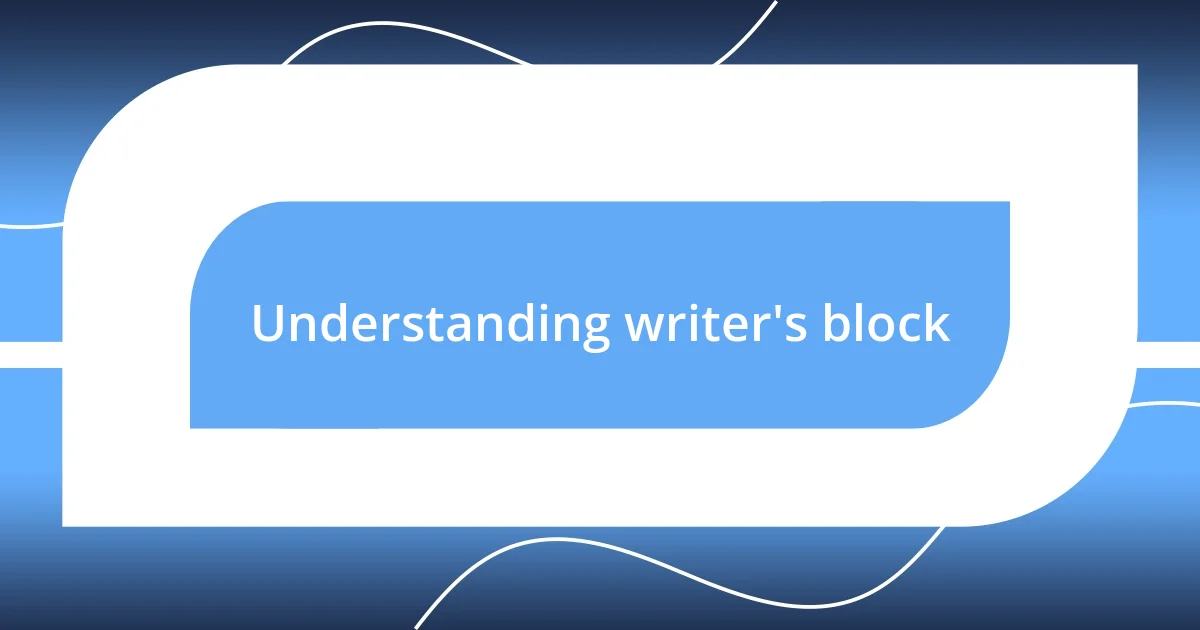
Understanding writer’s block
Writer’s block can feel like an insurmountable wall, one that we all face at some point in our creative journeys. I remember sitting in front of a blank page, feeling completely paralyzed by self-doubt. Why was it that the words that flowed so effortlessly before suddenly felt so heavy? It’s a frustrating experience, and it’s perfectly normal to feel stuck.
Many writers experience this mental stagnation when the pressure to produce outweighs the joy of creation. I’ve had days where my internal critic was louder than my creative voice, leading me to second-guess every idea. It’s a nagging fear that we’re not good enough, that our thoughts aren’t worthy of being expressed. Have you ever felt that creeping sensation, as if the very essence of your creativity has vanished?
Understanding this phenomenon requires acknowledging that it’s not just about a lack of ideas. It often stems from an emotional place—stress, perfectionism, or even fear of judgment. I learned that allowing myself to feel these emotions, rather than pushing them aside, helped me find a way through the block. When was the last time you gave yourself permission to simply feel? I found that embracing these feelings rather than combating them was the first step to breaking free.
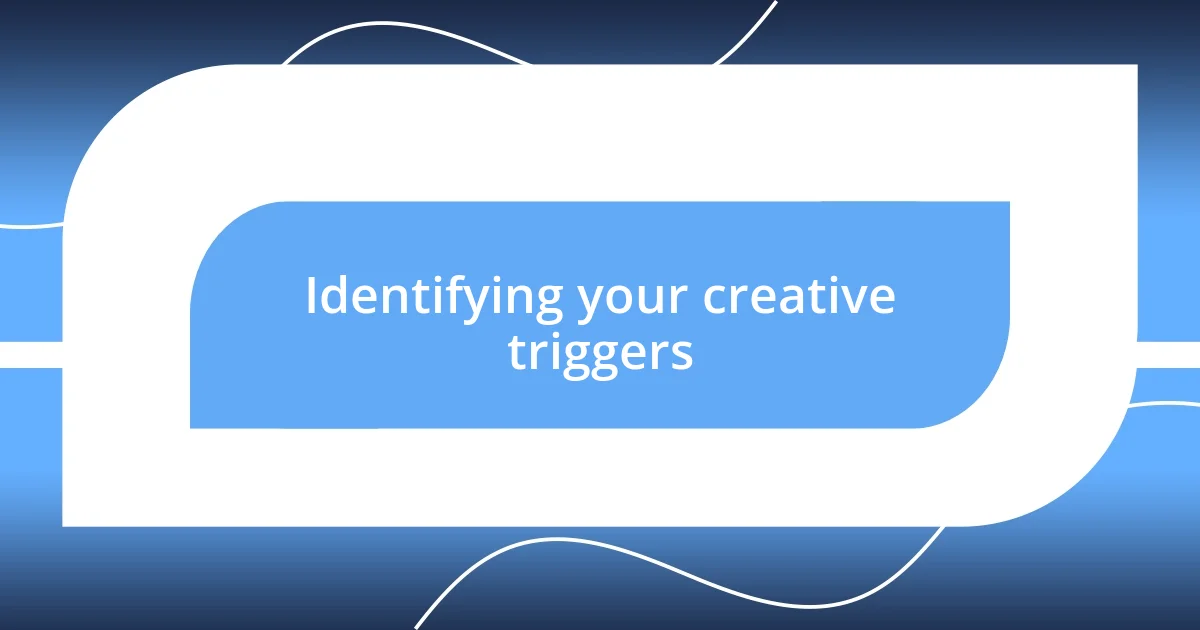
Identifying your creative triggers
Identifying your creative triggers is a crucial step in overcoming writer’s block, as understanding what inspires you can help reignite your passion for writing. For me, I’ve noticed that certain environments or activities can spark my creativity. For instance, a walk in nature or listening to my favorite music often clears my mind, enabling fresh ideas to bubble up. When I take the time to tune into what lifts my spirits, I find that words flow more freely.
Here are some ways to identify your creative triggers:
- Nature walks: Observing the beauty around me brings new perspectives.
- Music: Certain melodies can evoke emotions that transform into words.
- Art: Visiting galleries can inspire me with visual stories.
- Reading: Diving into different genres allows me to explore new writing styles.
- Meditation: Quieting my mind opens the door to richer ideas.
By paying attention to these triggers, I’ve been able to create a toolkit of experiences that foster my creativity. Each person’s triggers may vary, so it’s important to experiment and discover what uniquely fuels your imagination.
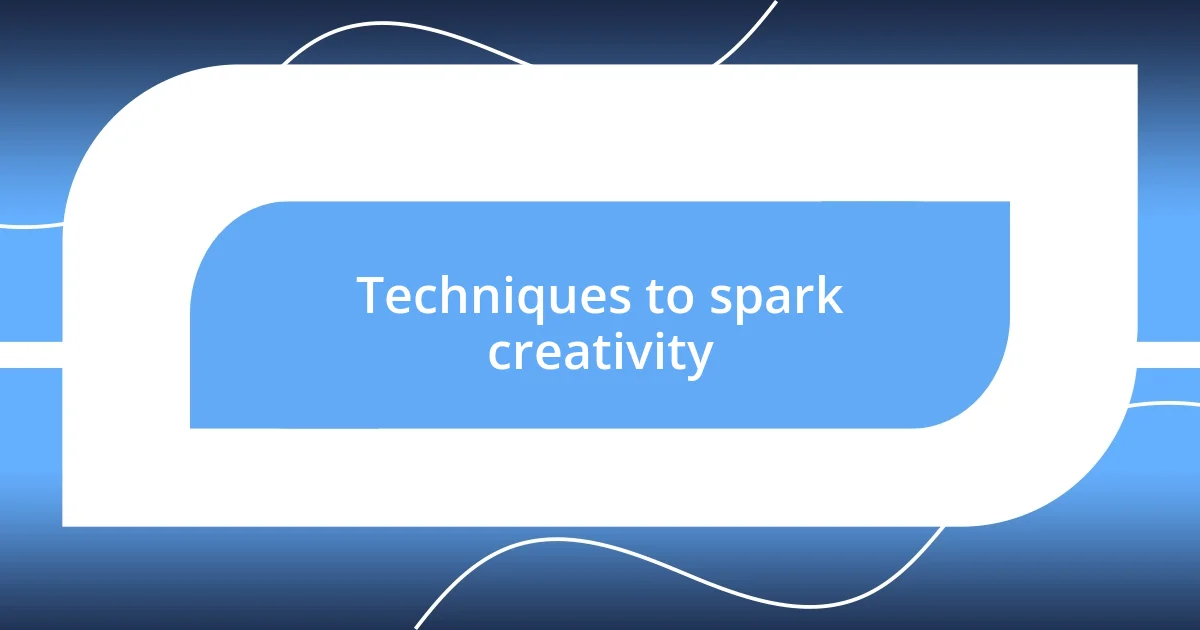
Techniques to spark creativity
When I’m searching for ways to spark my creativity, I often lean towards free writing. It’s one of those techniques that sounds simple but feels profoundly liberating. I sit down, uncensored, and just let the words flow for a set time. There’s something quite magical about relinquishing control, where I can scribble down anything that comes to mind, no matter how trivial it may seem. It’s during these moments that unexpected ideas often emerge, unburdened by the fear of judgment.
Another technique that has transformed my creative process is changing my surroundings. Whether I’m stepping outside for fresh air or just moving to a different room, a change of scenery can do wonders. I recall a time when I relocated to my favorite coffee shop. The ambient noise and the scent of freshly brewed coffee infused my thoughts with new energy. I felt invigorated, and before I knew it, I was stringing words together like never before. It’s fascinating how the environment can influence our creative energies.
I encourage everyone to experiment with art as a prompt. Picking up a paintbrush or trying my hand at collage can stimulate my brain in ways writing alone sometimes cannot. While I might not consider myself an artist, the process of creating something visual frees my mind from the constraints of words. Last month, I painted my frustrations instead of writing them down, and to my surprise, it was liberating. The act of creation, regardless of the medium, taps into a reservoir of inspiration that I often draw upon later in my writing.
| Technique | Description |
|---|---|
| Free Writing | Unfiltered writing to unleash thoughts freely. |
| Change of Scenery | Altering your environment to stimulate creativity. |
| Art as a Prompt | Using visual arts to overcome writing blocks. |
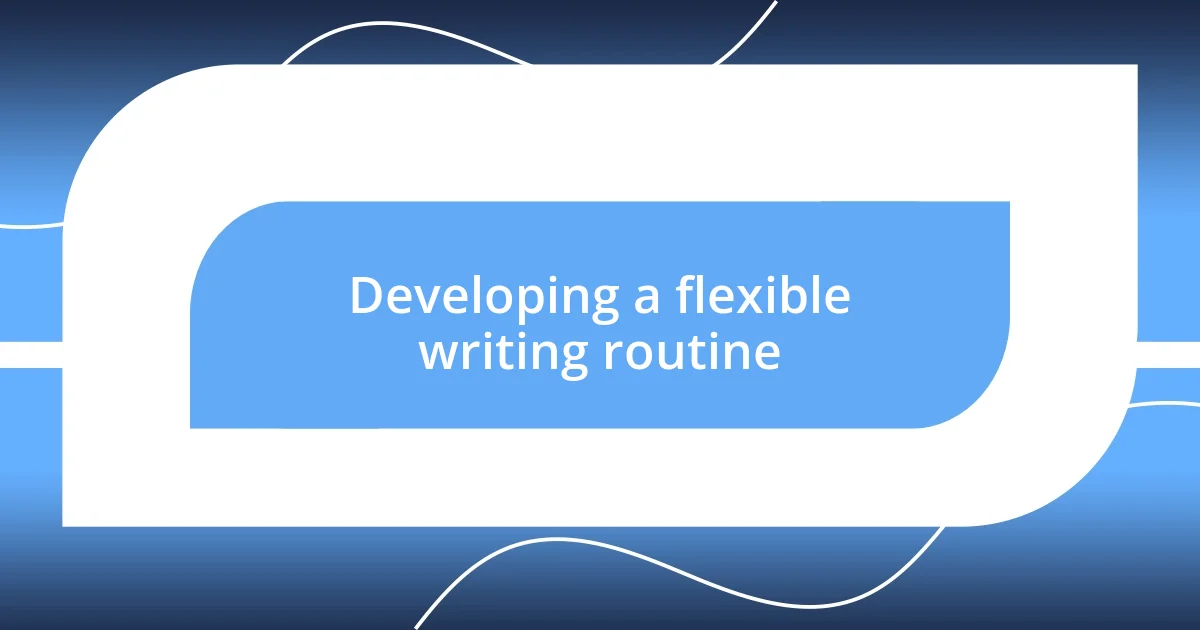
Developing a flexible writing routine
Creating a flexible writing routine has been a game-changer for me. I’ve noticed that life doesn’t always follow a strict schedule, and neither should my writing. For instance, I often find the best ideas come to me during those unexpected moments, like when I’m waiting in line or cooking dinner. Embracing spontaneity has allowed me to capture inspiration whenever it strikes.
I also weave in time for reflection, which I never used to prioritize. Each week, I set aside an hour to review my previous work and jot down my thoughts. This simple act helps me stay connected to my evolving writing style and reinforces my commitment to my craft. How often do you take the time to reflect on your writing journey? I believe this practice not only allows me to gauge my progress but also fuels my motivation.
Ultimately, setting a blend of structured and unstructured time to write has fostered a more enjoyable experience for me. I try to dedicate specific blocks for focused writing, but if I feel stuck, I’m also quick to abandon that routine for something entirely different, like jotting down ideas in my notebook while sipping tea. This flexibility has transformed writing from a chore into a delightful part of my day.
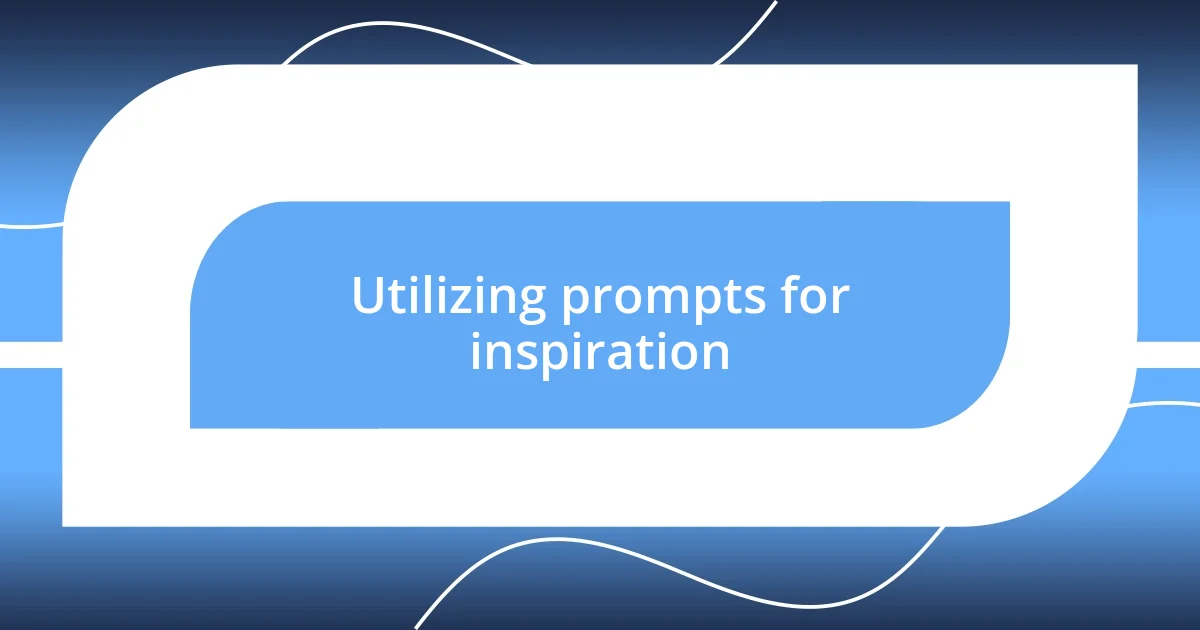
Utilizing prompts for inspiration
When it comes to overcoming writer’s block, I’ve found that prompts can be a lifeline. I remember feeling completely stuck one afternoon, staring blankly at my screen. In a moment of desperation, I opened a list of writing prompts I had saved. One caught my eye: “Write about a time you were afraid.” What started as a simple exercise turned into a deep exploration of my insecurities, leading to a piece that resonated with both me and others. It’s amazing how a few words can unlock such rich experiences.
I’ve also dabbled in the world of random word generators. Recently, while searching for something to spark my imagination, I tried this technique. The generator threw out the words “mystery” and “window.” At first, they felt disjointed, but after a few minutes of brainstorming, a story unfolded in my mind about a hidden world seen only through a cracked window. It reminded me of how sometimes, all we need is a nudge—a prompt that seems random but can coalesce into something meaningful.
Don’t underestimate the power of visual prompts either. I enjoy scrolling through Pinterest or flipping through magazines for interesting images. One day, I stumbled upon a photo of an abandoned carnival. The colors and the emotions it evoked transported me back to childhood memories. This visual sparked a short story that not only drew from the image but also tapped into my nostalgia for simpler times. Have you ever tried pairing your writing with images? It can add a whole new layer of depth to your creative process!
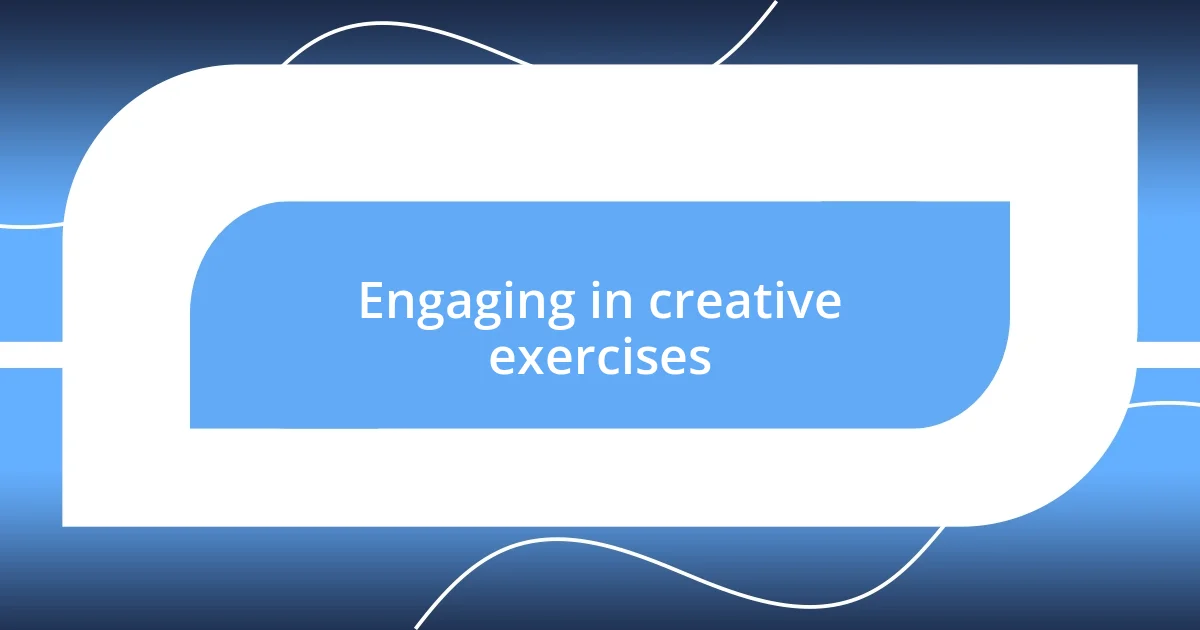
Engaging in creative exercises
Engaging in creative exercises can truly reignite your passion for writing. One method I’ve found particularly invigorating is free writing. I set a timer for ten minutes and let my thoughts flow without any filter. It’s liberating to write whatever comes to mind, no matter how nonsensical it feels at first. Just the other day, I ended up scribbling a wild tale about an enchanted coffee shop, and that unexpected twist led to the start of a fun short story I might not have explored otherwise. Isn’t it fascinating how letting go can unleash surprising creativity?
Another exercise I adore is the art of storytelling through different perspectives. I recently took a familiar scene from my life—like my morning walk to the coffee shop—and wrote it from the perspective of a curious squirrel. The experience was both hilarious and eye-opening. This approach forced me to see my routine in a new light and helped me to find humor in everyday moments. How often do we overlook the playful angles of our own lives? Embracing this exercise showed me that creativity thrives in the unlikeliest situations.
I’ve also found joy in experimenting with art and writing. On days when words escape me, I grab some colored pencils and just doodle or sketch scenes from my stories. For instance, a quick sketch of a fantasy landscape once inspired a whole new storyline. Combining visuals with writing not only breaks the monotony but opens up doors to narratives I hadn’t considered before. Have you tried blending creativity streams? It can be a refreshing way to break the writer’s block and spark inspiration!
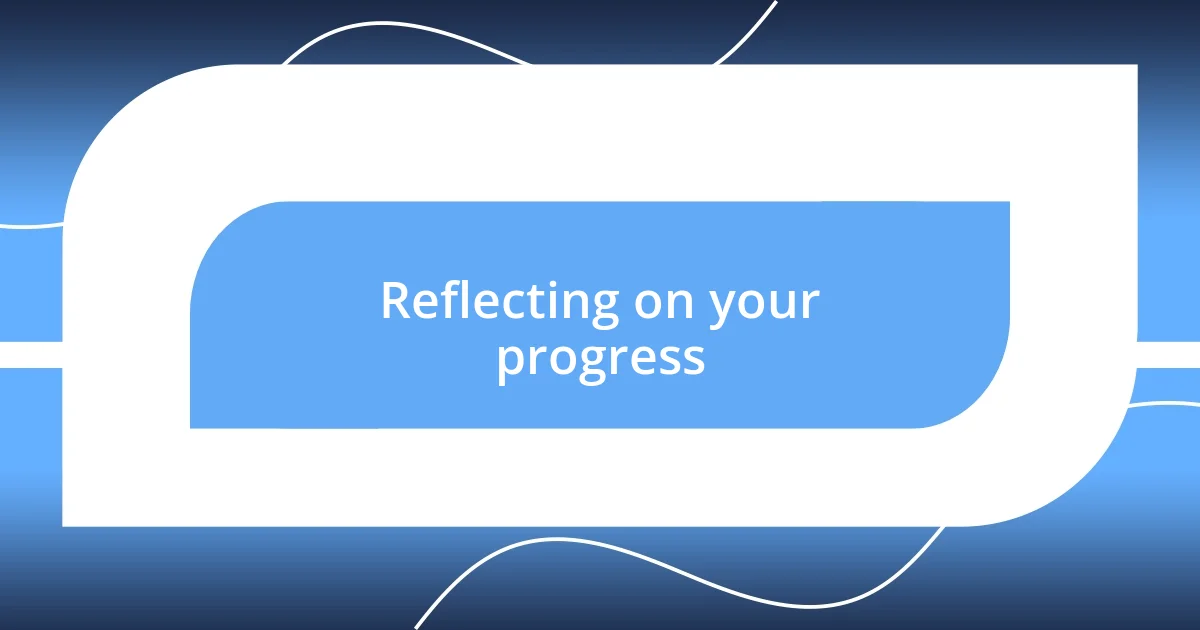
Reflecting on your progress
Reflecting on your progress can be one of the most enlightening experiences in your writing journey. The other day, I took a moment to revisit my old drafts. As I leafed through incomplete stories and brainstormed ideas, I realized how far I’d come. It struck me that each piece, even the ones I had abandoned, contributed to my growth as a writer. Have you ever revisited your past work? It can be quite revealing!
In my experience, celebrating small wins is crucial. I remember the thrill of finishing my first short story after months of struggle. Each completed piece felt like a stepping stone, pushing me forward and offering valuable insights. Reflecting on these moments helps me appreciate not just the destination but the path I’ve traveled. Isn’t it uplifting to acknowledge the effort you’ve put in, even if the outcome isn’t perfect?
Lastly, I’ve found it helpful to maintain a writing journal. Every quarter, I write a summary of my writing experiences, noting challenges, breakthroughs, and areas for improvement. That practice highlights not only what I’ve achieved but also reveals patterns I might otherwise miss. For instance, I discovered that I often get stuck during certain times of the year, prompting me to adjust my writing schedule. Have you considered documenting your progress? It can empower you to see your evolution clearly!





